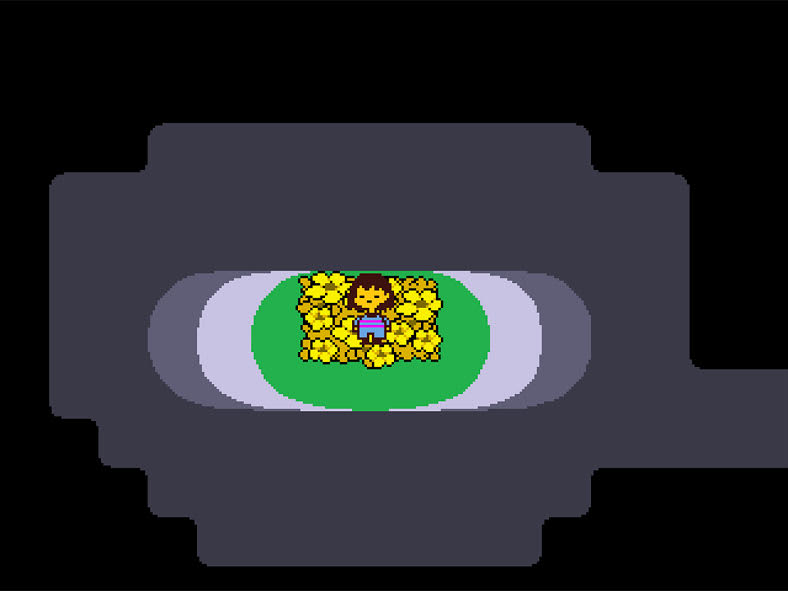
For those of you who love breaking the mold and being your own person, bandwagons and the people who join them are probably the center of your derision, and often with good cause. Bandwagons have led to terrible things, from racism, to fascism to Donald Trump’s recent presidential campaign. But what if the bandwagon actually leads to somewhere good? Like to the land of scantily clad women and free beef jerky? You’d be a fool to not jump on.
Overdone metaphors aside, if you’re in touch with indie games, you’ve probably already heard of “Undertale.” While it has been out for almost a month at time of writing, it has only recently gained prominence, receiving recommendations from people all over the gaming community and currently the highest-rated PC game on Metacritic. I guess this review could be seen as me jumping on the bandwagon. However, I would like to let all of you know that I tried really hard to not like this game. Whenever someone sings the praises of absolutely anything, I feel it is almost human nature to try and prove them wrong, with this effect being amplified for an iconoclast like myself.
But no, this game won me over. Its childish charm, tight gameplay and impressive depth and wit warmed my icy heart. So yeah, “Undertale” is a bandwagon, but I’m jumping the fuck on.
Our story opens with a small child falling into a mountain and ending up in the world of monsters. After being taken in by a matronly goat-demon you must embark on a quest to return home to the surface, using the power of friendship to best the various boss monsters on your path if you’ve paid attention to the tutorial and using the power of murder if you’re a bastard.
The game, with its minimalist soundtrack, dialogue and color palette, does a fair bit of showing without telling, illustrating the world of monsters through still backgrounds and the occasional bit of flavor text imparted by some various creature or another.
I’m being a little stingy with the details, partially because I don’t want to ruin the surprise for any of you potential players and partially because any individual part of the story taken out of context would sound completely insane. An octopus-onion jumping out of a wading pool and explaining her opinions on modern music while you’re on the run from a spear-wielding hunter of humans makes perfect sense in the context of the game, but using that line while explaining the tenets of anything is ample grounds to get committed to an asylum.
I’m not finished playing at time of writing, likely due to the fact that “Undertale” is the game that gives you a massive world to explore with little direction. There’s no way of knowing if taking a particular path in a dungeon is going to continue the story or take you to a spider bake sale. I’m a sucker for emergent story and gameplay, and I probably would have finished if I hadn’t spent two hours petting snow dogs or gambling on snail races with a dapper ghost.
The gameplay, aside from walking around and clicking on things, mimics early ‘90s JRPGs, a la “Earthbound” and the early “Final Fantasy” games. Occasionally mobs will pop up during exploration, and the main puzzle of monster battles is figuring out the specific series of steps you must follow if you want to avoid playing as a monster serial killer. While it does get annoying having to have a sexy dance-off with a series of sentient jello molds for the 50th time, the mobs are varied enough that the gameplay avoided becoming tedious during my play through.
“Undertale” is not without its faults, and the minimalist user interface led to endless frustration in my first hour of play. I only figured out how to open the in-game menu while absentmindedly tapping my keyboard in the middle of figuring out a particularly devious room puzzle. Control issues aside, the game truly sparkles when the tutorial level is over and you’re sent into the grand over world where most of the plot takes place. The characters and enemies all have their own hopes, dreams and wants, with each trying to make their way in the subterranean world.
The narrative dialog avoids the trap many RPGs fall into of being mired in severe melodrama, and I legitimately laughed during much of my time playing, once I stopped trying to rush through the opening dungeon and really let myself get sucked in. One scene that particularly stuck with me was trying to avoid being captured by a skeleton guardsman at the beginning of the second act, culminating in going on a date and debating the finer points of Italian cuisine. This, at its core, is the best aspect of “Undertale”: it knows the player is here to have fun, and avoids taking itself too seriously.
“Undertale” does have a moral choice system, but it avoids being obtuse and makes sense in the context of the world. While I usually tend to see moral choice systems as a challenge to try to play as a cross between Ted Bundy and Lex Luthor, the childlike wonder of the game made me try to play as a legitimately good person, even during the 50-plus jello mold slog that is the first level.
If my ham-fisted attempts at extolling the virtues of “Undertale” haven’t convinced you to play yet, understand that I’m a man of limited talent and trying to explain something as nuanced as “Undertale” is certainly above my ability. The game is utterly unique, and I’m sure that even non-gamers can find something they love about it. Besides, it’s only $10, which is a much better deal than paying $60 or more for “Call of Duty 37” or whatever cash-in crap is dominating the market nowadays.
Rating: 4.5 stars








